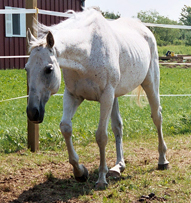 Parasite control is an important part of every equine health care program. Today, it’s no longer enough just to know what worms are bugging your horse. Now, you need to understand the basics of parasite resistance to ensure your program is effective.
Parasite control is an important part of every equine health care program. Today, it’s no longer enough just to know what worms are bugging your horse. Now, you need to understand the basics of parasite resistance to ensure your program is effective.
If you already have enough to keep track of, don’t worry — veterinarians are your ally in keeping all the information straight. They also will help with developing and monitoring your parasite control program to ensure effectiveness and to keep resistance at bay.
When considering your parasite control program, there are 10 key things to keep in mind:
1. Resistance is a real threat. With no new parasite control products on the horizon, it’s important to start protecting our ability to control parasites by keeping current products effective.
2. Know the product class. Nearly all equine parasite control products belong to one of three different classes: benzimidazoles, macrocyclic lactones and pyrantel pamoates.
3. Use what works. It’s important to know what class you’re using because many experts believe macrocyclic lactones is the only class of medications that is capable of controlling key parasites in adult horses. For example, ivermectin is part of the macrocyclic lactones class.
4. Don’t rotate without reason. Many experts believe rotating through a series of different drugs will mask the effects of using products with resistance problems. In fact, information shows rotating through different parasite control products does not appear to slow the development of resistance.
5. A few worms are OK. In the past, the goal of parasite control programs was to completely eliminate all parasites. However, today’s programs should be focused on reducing transmission of parasites, keeping worm burdens below harmful levels and treating clinically affected horses. Maintaining a population of parasites that can be killed by dewormers is an important factor in delaying the development of resistant parasites.
6. Get the information. By performing a fecal egg count reduction test (FECRT), your veterinarian can help identify the key parasite threats on your premises, if the products you are using are working and what products should be included in your parasite control program.
7. Know what’s on your farm. The species and amount of parasites attacking horses can vary by geographic area. For instance, tapeworms may be found more frequently in the upper Midwest or southeastern parts of the United States, and less frequently on the west coast.
8. Get it done right. FECRTs can easily be misinterpreted if samples are collected, handled or analyzed improperly. Be sure these tests are properly conducted by veterinarians or by independent, reputable laboratories.
9. Treat the “problem” horses. It’s estimated that 20 percent to 30 percent of the horses on a farm put out about 80 percent of the parasite eggs, while other horses tend to shed fewer worm eggs whether treated or not. By focusing treatments on horses shedding most of the worm eggs, you can help maintain a population of susceptible parasites, reduce the risk of resistance and help keep horses healthy.
10. Guarantee success. We are all concerned about keeping our horses healthy, and the best way to make certain your product works is to look for products with a 100 percent product satisfaction guarantee.
With several different kinds of parasites waiting to attack horses and confusion surrounding the resistance problems of some parasite control products, it is harder than ever to be sure all key parasite threats are controlled. Keep these 10 tips in mind and your veterinarian’s number handy, and you’ll be set for the new era of parasite control.
Dr. Cheramie specializes in equine surgery and performance horse medicine and has a special interest in colic and performance limiting problems, including gastric ulceration and lameness. He holds a doctorate of veterinary medicine from Louisiana State University and is a diplomate of the American College of Veterinary Surgeons.





Thanks for a great article
great article
*snicker* That horse does NOT look happy!
good article
Always good to get more information about deworming.
If your horse has worms how can you tell, will they always be in your horses poop if you horse has worms?
good info. I really like that you can comment on this site without actually having to be a member.
I don’t live in a problem area but when I do worm I rotate wormers. I don’t understand the point made here about this not working. Could we have another article specifically about the pros and cons of rotating wormers?